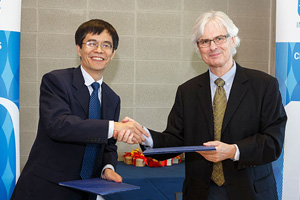UOIT expands international presence with new partnerships
New MOUs signed with four Chinese universities
October 29, 2013

New partnerships between the University of Ontario Institute of Technology (UOIT) and four leading research-intensive universities in China represent the latest additions to a growing list of academic bridges UOIT is establishing between Canada and the rest of the world.
UOIT has signed Memorandums of Understanding (MOUs) with:
- Harbin Institute of Technology Graduate School (Shenzhen, China)
- Tongji University (Shanghai, China)
- Shanghai Jiaotong University, State Key Laboratory of Mechanical System and Vibration (Shanghai, China)
- Shangdong University of Technology (Zibo City, China)
The new agreements doubles to eight the number of agreements UOIT now has with universities in China. UOIT has more than 50 agreements with institutions in more than two dozen countries, which cover the sharing of research, faculty and student exchanges and co-operation protocols.
“These new agreements fully represent the kinds of strong international partnerships that are helping the University of Ontario Institute of Technology contribute to Durham Region’s and Canada’s economic and social development and global competitiveness,” said Dr. Tim McTiernan, UOIT President and Vice-Chancellor. “We look forward to the productive results and new exchange opportunities these new protocols will generate for UOIT and for our partners.”
“These agreements will allow our researchers to collaborate with leading research scientists and engineers, and allow our graduate and undergraduate students to spend time in China to pursue their studies and engage in advanced research projects,” said Dr. Michael Owen, UOIT Vice-President, Research, Innovation and International. “We are excited about developing these new partnerships which facilitate the exchange of research scientists, engineers and students from these universities to UOIT.”
In 2012, UOIT signed MOUs with Donghua University in Shanghai and the North China Electric Power University in Beijing. Previously UOIT had signed MOUs with Southeast University in Nanjing and the Nanjing University of Technology.
Dr. Owen says China is aiming to raise the research performance of some 100 high-level universities and cultivate an elite cohort to advance national economic and social development strategies. The national government is also providing funding to specific universities to build new research centres, improve facilities, hold international conferences and attract world-renowned researchers.



